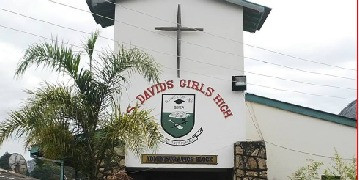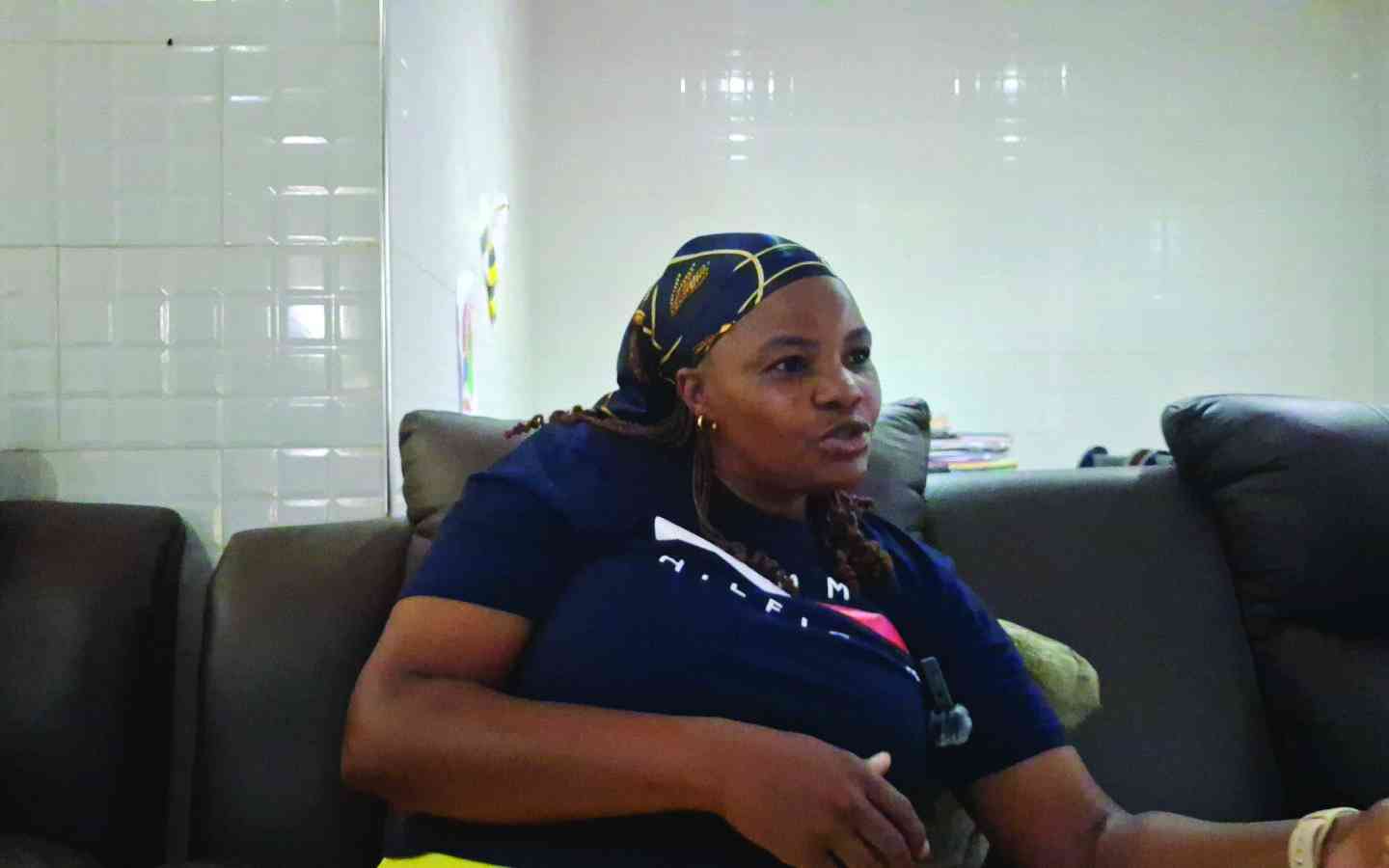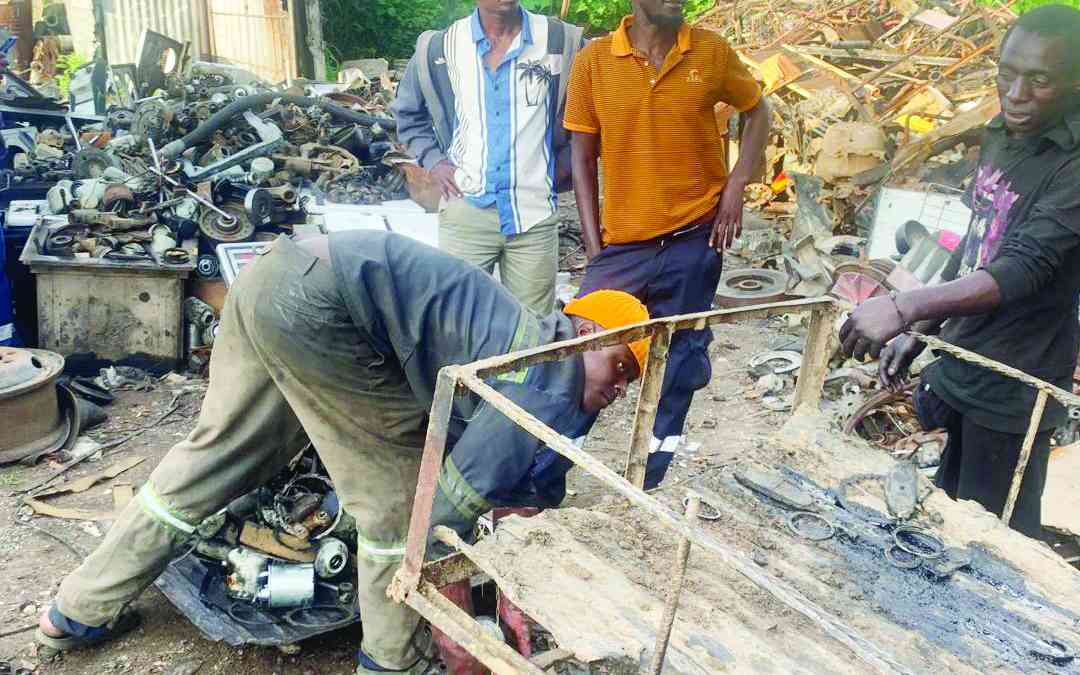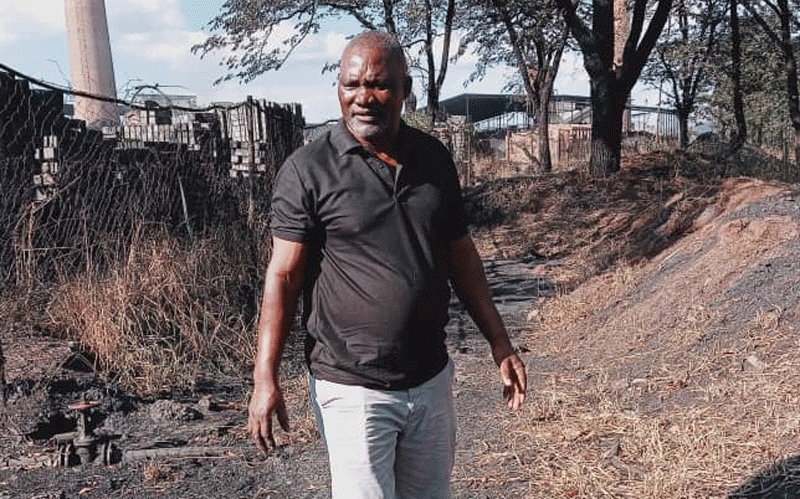
Skefa Tembo appears dejected and lost as he inspects his maize field that is enveloped by a cloud of coal dust with prospects of a decent harvest vanishing for yet another season.
Tembo (67) and his family from Madumabisa village on the outskirts of Hwange town, Matabeleland North, have relied on subsistence farming for generations for survival, but newly established coal mines in the area are increasingly threatening their livelihoods.
“For the past few seasons, farming here has been very difficult because of coal dust coming from the mine,” Tembo said. His fields are a few metres from emerging Chinese-owned coal mining giant South Mining’s operations.
An investigation by The Standard in partnership with Information Development Trust, a non-profit organisation supporting investigative journalism in Zimbabwe and southern Africa, revealed that the Madumabisa community is suffering the brunt of the worsening pollution due to the rapidly expanding coal mining activities.
Tembo’s homestead is located close to South Mining Company’s coke production facility that was set up outside Hwange in 2008.
The company’s main activities are coal mining and production of metallurgical coke and its by-products that are sold in markets that include Zimbabwe, Zambia, Democratic Republic of Congo, Botswana and South Africa.
South Mining, which has its headquarters in Harare, has two operations in Madumabisa and Chaba with an output of 100 000 and 200 000 tonnes per annum respectively.
Tembo said he has tried to engage South Mining for the past three years over the pollution, including advising them to dig a trench that will divert waste from their plant away from his fields, without success.
- Poaching syndicates trap vulnerable villagers
- Power cuts spur Zimbabwe’s green energy revolution
- Power crisis needs practical solutions
- Youth candidates debate manifestos on social media
Keep Reading
“The trench was dug, but it was never maintained and that meant the pollution continued unabated,” he said.
“The heat from their small ovens affects our crops and the vegetation around this area.”
Tembo’s household is among about 50 families in the dry Madumabisa area, who say their farming activities have been disrupted by South Mining’s coal mining operations.
Agriculture in the semi-arid areas was already a difficult undertaking before the complications caused by coal mining as farmers battled frequent droughts, extreme heat, low rainfall, bared and marginal soils.
The increased mining activities in the past five years in the coal- rich, but dry Hwange district has negatively affected the lives of many in communities such as Madumabisa as it pollutes the environment, including water sources.
Coal is one of the minerals earmarked for rapid exploitation by President Emmerson Mnangagwa’s administration as he targets a US$12 billion mining industry by end of this year, but various studies have shown that it is coming at a heavy cost to communities around Hwange.
Chinese investors have been opening coal mines in the district since 2017 amid concerns that there is limited regulatory oversight to ensure the protection of the environment.
About 13 companies from the Asian country have opened coal mines in the Hwange area and they include South Mining, Hwange Coal Gasification Company, Dinson Colliery, Zimbabwe Zhongxin Coking Company, Mugatech Mine, Zhong Jian Coking Plant, Dinson Quary, Kamativi Mining Company, Sunrise Chilota, Zimfow Coal Washing, Elbas Lead Mine and Jin An Coking, among others.
Coal fines that get swept into the farmlands during the rainy season have increased the soil acidity and are making it difficult for communal farmers to engage in any agricultural activities, Tembo said.
Coal fines or coal dust are by-products of the coal-mining processes that have a low market value, are generally expensive to dispose and usually left in stockpiles or slurry ponds at, or near processing mining sites.
According to agronomists, coal fines affect plants by either reducing yields or degrading the quality of agricultural products.
Where they are found in large quantities, cultivation of crops and rearing of livestock becomes difficult because they reduce nutrients in plants and inhibit digestion in animals.
Michael Montana, an environmental impact assessment expert who has previously advised some of the coal companies, said coal fines were a threat to plant life and have to be controlled from the source.
"Whenever there is rain, the coal dust affects the soil nutrients and this affects crop germination and growth,” Montana said.
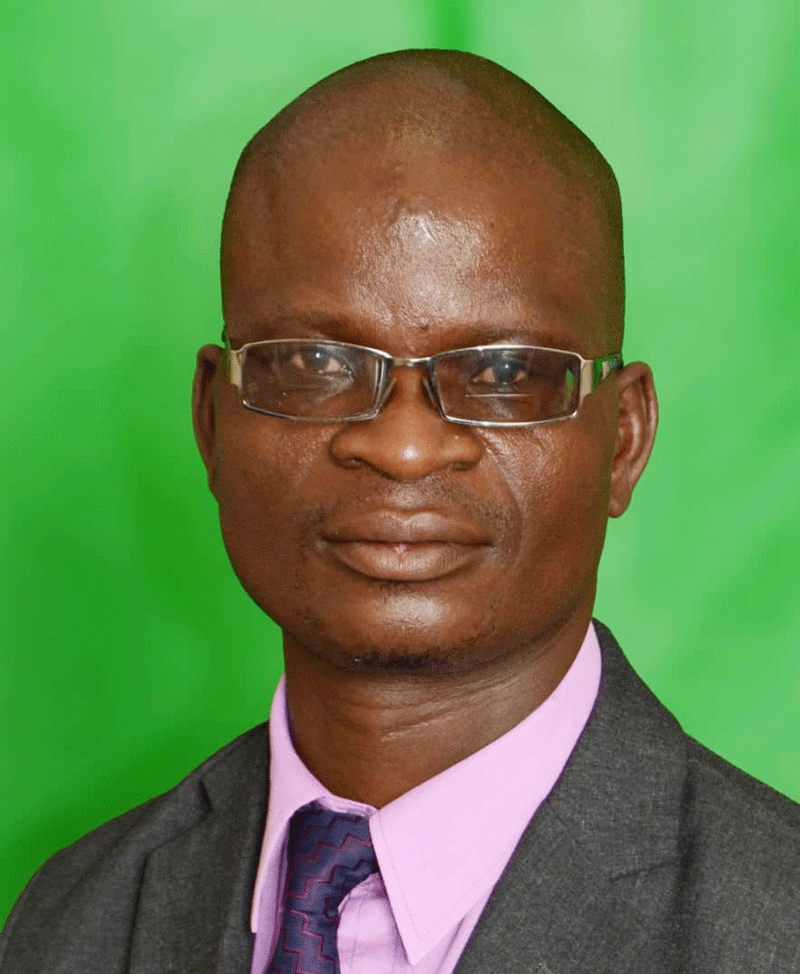
“The crops will germinate, but they won't thrive as they suffer stunted growth.”
Catherine Kunda (75), also from Madumabisa, complained that South Mining never fulfilled its promises to help her set up a piped water scheme to do market gardening after her fields were polluted by coal fines from the mine three years ago.
Kunda said the company also drilled a borehole in her field without permission.
“They promised to set up a piped water scheme after their coal (fines) polluted my fields, but they have not fulfilled their promises,” she told The Standard.
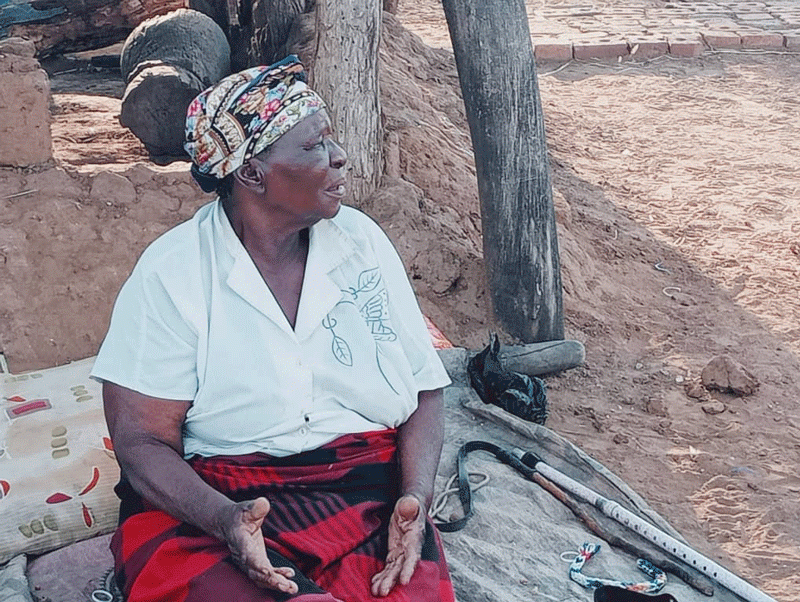
Arabia Sibanda, a village head from Madumabisa, said his subjects needed protection from government agencies such as the Environmental Management Agency (EMA), which had the mandate to ensure coal mining companies played by the rules.
“I have on several occasions implored local EMA officials to come and do an audit on some of these companies because the pollution situation is getting out of hand,” Sibanda said.
“The quality of water in Deka River is not looking good even though I am not an expert on such issues, but this calls for urgent action from the authorities.”
Investigations revealed that communal farmers from the Zwabo and Mashala areas, also in Hwange, that rely on the Deka River for their livestock and household use have been heavily affected by the pollution of their main water source.
The pollution of the river, a tributary of Zambezi River, also has a heavy socio-economic impact on the communities as they used to enjoy fishing as a source of food and livelihood as they sold fish to get some income.
The Centre for Natural Resource Governance (CNRG), a natural resource governance lobby group, said its work with Hwange communities had shown that Deka River has been polluted by hazardous discharges from coal mining activities, which are poorly regulated.
“Coal dust particles settle on green leafy vegetables, which are a source of food for most families in and around Ingagula and Makwikwa villages,” said CNRG, which has a pool of environmental experts assisting the affected villagers.
“This poses a health risk if the vegetables are not thoroughly washed before consumption,” it added.
“The coal dust also settles on washed clothes, which makes it difficult for most women to use washing lines for drying their laundry as they risk getting dirty from the coal dust.”
The communities, with the help of CNRG, have since developed an environmental audit toolkit, which they use periodically to collect data and identify non-complying companies with the help of EMA.
South Mining spokesperson Charles Muchabaiwa said the company was not responsible for the pollution of Deka River as it recycled the water used in its mining processes.
Muchabaiwa said they would investigate claims by villagers that their operations were polluting the environment.
“For the record, water from coal processing is not discharged into Deka River, but it is recycled through a very elaborate process for reuse,” he said after inviting The Standard for a tour of the affected villagers’ fields.
“Concerning the villagers’ concerns regarding the pollution of their fields, our safety and health officer is busy looking into the issue for corrective action.
“We have in the past communicated with villagers that they are free to use some of the decommissioned boreholes that were drilled by the company in their fields if they have the necessary water pumping equipment.”
He added: “We are also in constant communication with traditional leaders such as chiefs and village heads on such related issues.”
EMA’s Matabeleland North environmental officer for education and publicity Mildred Matunga said the authority carried out regular inspections “on all prescribed projects and the associated landscape/ecosystem to ensure compliance”.
Matunga said they punished companies that were found to be polluting the environment, but could not say whether South Mining was one of those caught on the wrong side of the law.
Fidelis Chilima, coordinator of the Greater Hwange Residents Trust (CHRT), said his organisation was recently forced to petition Parliament to help fight pollution in Hwange through the strengthening of laws regulating mining companies.
“We went to Parliament three months ago to lobby against pollution by these new coal mining companies and also deal with the issue of pneumoconiosis,” Chilima said.
Pneumoconiosis is a group of lung diseases caused by inhalation of dust and one of them is coal workers’ pneumoconiosis (commonly referred to as CWP or black lung), which is caused by inhaling of coal mine dust.
Through its petition, CHRT wants parliamentarians to push for the amendment of the Pneumoconiosis Act to also protect people other than mine workers, who are exposed to pollution.
Brandina Nyoni from the Zwabo area is one of the villagers who believed that they had developed health complications due to exposure to pollution by coal mining companies.
Nyoni claims she started suffering from stomach pains, an itchy skin and developed wounds all over after drinking water from Deka River.
“I have sought treatment at the local clinic, but some of the symptoms only disappear for a few days,” she said.
“We have since stopped fetching water from the river and we now rely on boreholes.
“The river used to be our source of income from both fishing and market gardening, but we can no longer use the water due to pollution.”
Montana, the environmentalist, said pollution of water sources in Hwange such as Deka River was a major source of concern.
“What makes it more painful is that the responsible authorities are fully aware of the pollution of Deka River, which has been publicised by various media houses after fish were found dying due to poisoning,” Montana said, adding that coal miners should be forced to test water samples in areas where they operate.
“After analysis of all water samples, the affected companies must be made to sit at a roundtable to discuss their findings and where there are problems, remedies must be found,” he said.
“I can speak with authority that Chilota Mine, Hwange Colliery and South Mining have vibrant corporate social responsibility and environment management policies that are very elaborate on such issues.
“The problem is that the policing is very weak and there is a lot of political interference in Hwange and this could be a problem.”
He said some foreign companies used political cover to evade statutory obligations such as environment protection.
Montana said the coal miners did not invest in environment protection because they believed it cut into their profits and urged the government to pay attention to the mining activities in Hwange as they would have a long term impact on communities.
Two years ago, villagers from the Makwa and Mashala areas in Hwange with help from the Zimbabwe Environment Lawyers threatened legal action against mining, saying pollution of water sources had left them battling health problems such as “rotting teeth, swollen stomachs and stunted growth.”
They also complained about death of aquatic life and livestock as well as the destruction of vegetation and crops due to pollution.

